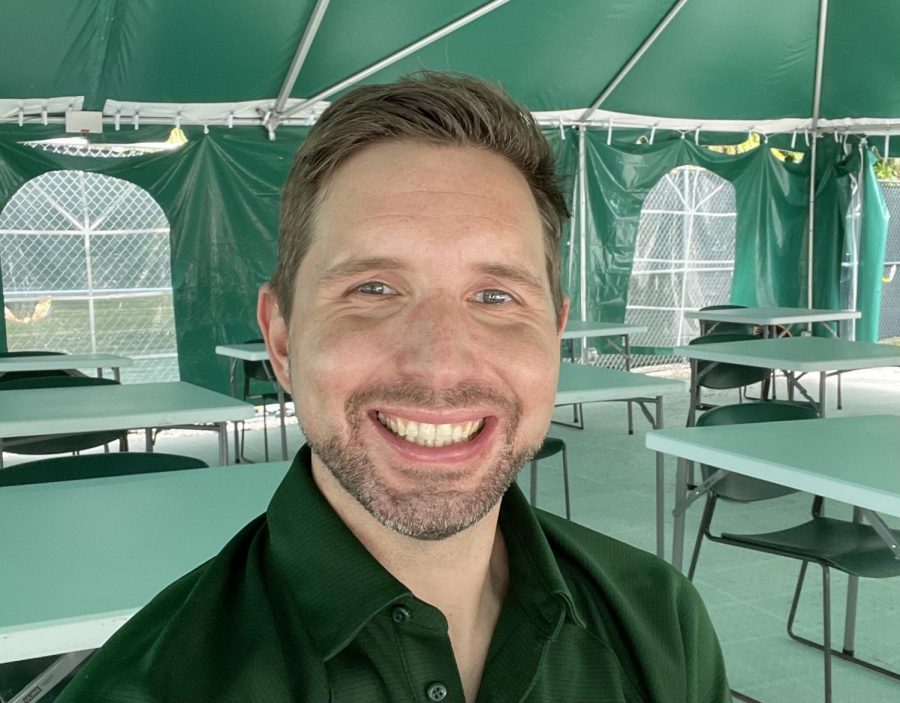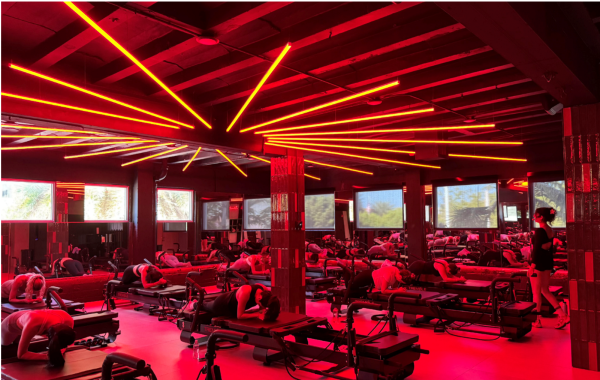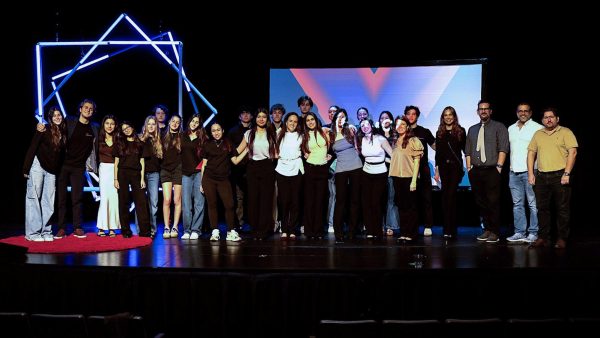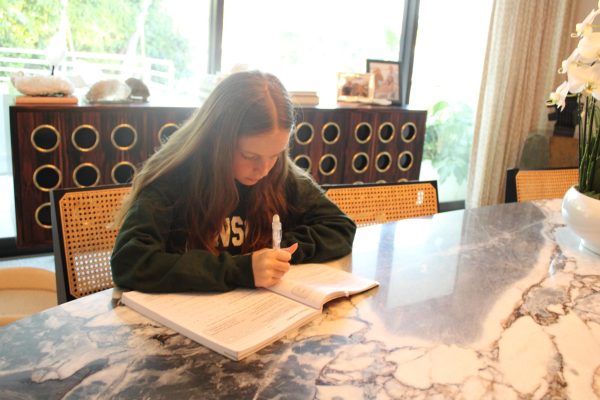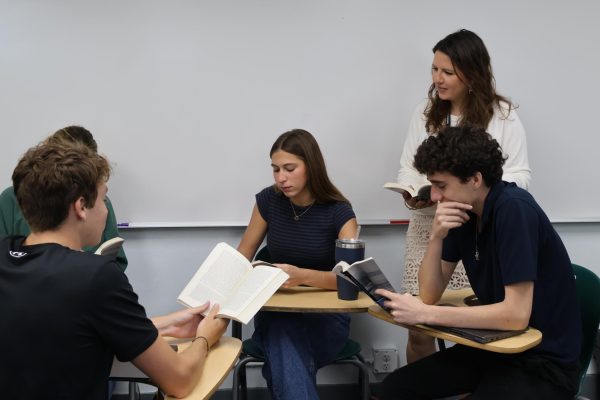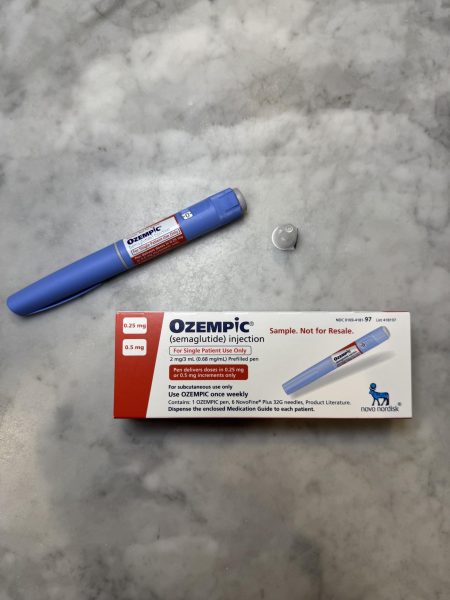New Additions to the RE Family: Dr. Morse, Dr. Helmers, and Mr. Amaro
Dr. Matthew Helmers, the new English Department Coordinator.
This year, Ransom Everglades School welcomed new teachers and faculty members to the community despite the challenges of the COVID-19 pandemic that have interfered with the school year. The new educators who joined the RE community this past fall have had a distinct experience compared to that of new teachers in the past since the school year began virtually, preventing them from physically being present, and so much else is different this year. Meet Dr. Morse, Dr Helmers, and Mr. Amaro. Mr. Amaro is a World Languages teacher, Dr. Helmers is the Upper School English Department Coordinator, and Dr. Morse is an English teacher. Below we can read about their first semester at RE as they paint a picture of what that was like for them.
What was your first semester like at RE?
“My first semester at RE was overwhelming and thrilling, filled with many surprises both difficult and delightful. I was very grateful to be paired with an amazing co-advisor, Mrs. Sanchez, who not only explained all the nuts and bolts of RE to me, but also offered genuine friendship. Likewise, I quickly found a strong community with the English department—especially the other newbie, Dr. Helmers—and our amazing Humanities department head, Ms. Nero. Although it was challenging to get a grip on the new curriculum and ever-changing classroom environment, I always felt supported by my inspiring, dedicated, and super knowledgeable colleagues. And, of course, I was motivated every day by the students who are such passionate learners! It was difficult to get to know them on an individual basis while we were remote, but I thoroughly enjoyed making those personal connections once we returned to in-person learning.” -Dr. Morse
“Wild! Emotions have been continually at a maximum, but it has been a privilege to help our community through such a challenging time. I’ve loved experiencing the support and goodwill of all of the students and the faculty. It’s such a joy to work at a school that is so well structured even during these ‘unprecedented times.’” -Dr Helmers.
“Before the semester started, I was expecting to face some challenges mostly because all my previous experience was teaching college students and had never taught at a high school. Many of my concerns were related to the level of maturity of the students, thinking that in high school I would have to change some content of my classes and how I should communicate with students. To my surprise, I found that RE students are very well prepared, and it has facilitated my process of adaptation. I also found a very engaged community and at first, it was overwhelming the amount of information related to activities and services, but also later I learned that a lot of what is done is based on the proactivity of students and a true interest in doing the right thing and the involvement of faculty becomes natural.’ -Mr. Amaro
What was it like adjusting to a new school while needing to follow all the COVID-19 protocols?
“I definitely struggled with the mask situation while adjusting to the new school environment. I am always smiling, and it’s important for me to be able to show people that I’m friendly and enthusiastic. I felt uncomfortable that people (who didn’t know me yet) couldn’t see me smiling. I also struggled to put names to faces with masks on. Still, as with all things COVID related, I grew accustomed to it.” -Dr. Morse
“Pretty easy, because I was already primed to adapt to a constantly changing situation. I knew that joining RE I would involve learning new traditions, common practices, and institutional habits. This year, all of that just came along with COVID protocols too. I think it will be strange next year to learn what was ‘just during COVID’ and what is a regular RE protocol. Emotionally, I think it’s been easier for me as well, because I’m not aware of all the awesome RE stuff that I’m not getting to do because of COVID—and I just look forward to getting to experience all of those things together next year!” –Dr. Helmers
“Apart from learning about the school and adaptation process mentioned before, COVID made my semester full of firsts. I still remember my first online meeting with the faculty of the World Languages Department and trying to figure out who is who, and not being able to approach anyone individually to ask about their experience as I would do if it was an in-person meeting.
My first advisory meeting and having no idea of what the advisees would expect from me. First online class, teaching from home, and barely being able to see the face of the students, not knowing what was going on behind their screens and if I was providing them the content of the course the right way.
Then came my first day on campus: empty, wandering around to find my office, meeting some of the faculty in-person for the first time, locating my classrooms, imagining how it would feel to see the campus alive, all while going to an empty classroom and connecting with students as if I was still at home but with a different background…
Until finally the day that (some) students were back in class: For me, that was my real first day at school, teaching students in the environment where we belong. Being able to look at them and read their reactions, from their eyes find out if they have questions, and to know that there is nothing distracting behind their screen. I am 100% positive that I and the body of faculty of RE have done the best to provide the best remotely, but nothing is comparable to the experience in class. Up to now, I am still meeting students in person for the first time, and every time one more student joins us on campus, it increases my motivation to teach.” -Mr. Amaro
What differentiates Ransom from previous schools you have taught at?
“I spent the last six years teaching at the college level. I taught at UCLA and Pitzer College, which are both great schools, but the university classroom style doesn’t allow you to make deep connections with the students (since you only see them 1-2 times a week for 10-14 weeks). I have loved forming closer bonds with my students here at RE. I appreciate how the students here are such active learners and are eager to make connections between school and their personal lives. In general, the students here are incredibly motivated and curious; it brings me so much joy when they ask me for book recommendations, or we meet for lunch and office hours to discuss reading outside of class.” -Dr. Morse
“Ransom Everglades values the entire student. I know that sometimes amidst homework loads and high-stakes tests and COVID, we may struggle to see how RE is invested in creating that third class of people at the core of Paul Ransom’s letter, but, the advisory program, the numerous clubs and sports, the publications and arts, the lunchtime chats and the traditions that continue (like the canon and the senior events!) – all these things show how an RE student is more than the academics.
RE students also possess a deep love of learning. Every day, my incredible students enter the classroom already discussing the implications of last night’s reading – and it takes everything in my power to just take attendance before we’re back into the nuances of the text.”-Dr Helmers.
“All my previous experiences were teaching at universities. Many students were taking the language classes to fulfill their language requirement and were not conscious, or not focused on taking advantage of the benefits of learning a second or third language. At RE, I have noticed that students are more culturally aware and are willing to dedicate themselves to go beyond. I see more interest of some students in the cultural aspects, and at every class realizing that language learning is not only about the language but also about learning perspectives of a different culture.
The sense of community at RE is also vastly different from my previous experiences as college faculty.” – Mr. Amaro
What has been your fondest/ best memory of RE thus far?
“It’s hard to choose a “best” memory, because I’ve had so many lovely moments here at RE. So, I’m just going to share something special that happened recently.
One of my students from last semester (who had been remote the whole time) returned to school in person for the second semester. Although they were no longer in my class because it was a one-semester elective, the student made a bouquet of flowers and brought it to me at school to introduce themself and thank me for the class. I was so incredibly touched by this beautiful gesture! I absolutely love teaching English, and it means the world to me when students express their appreciation for my class.”-Dr. Morse.
“Too many to mention! But some highlights:
-Maintaining a Harkness discussion in hybrid form, debating morality, historiography, the American dream, the rise of Renaissance Humanism… and some fantastic pieces of literature.
-Forming the Dr. Helmers’ Karaoke Club through accident, enthusiasm, and the incredible vocals of my students
-Learning what TikTok dances are and doing several (socially distanced) ones
-Celebrating birthdays with surprise cupcakes and cookies; and celebrating Thursday with surprise delicious brownies!
-Welcoming students into the ‘Beige Palace’ (aka Mr. McCrink’s and my office)—now with more candy!
-Nerding out with fellow teachers and students at planning meetings, curriculum meetings, section meetings and DEI meetings… at the end of every day here I have had at least one deep, soulful conversation that has changed the way I appreciate a particular topic.” -Dr. Helmers
“Without a doubt, the first class with 100% of the students in the classroom was a day to remember. Also, the sad moments we had, like the passing of Mr. Che and the reaction of students, faculty, and staff, were extremely touching, and they showed me how special RE is.” –Mr. Amaro
Dr. Matthew Helmers arrives to the English department from the BASIS Scottsdale Charter School in Arizona, where he taught as an English teacher and as Master Mentor. He is a 5th generation Arizonian. He attended Arizona State University for undergraduate in literature and Spanish (double major). Shortly after he moved to England to pursue his master’s degree in literature, theory, and culture (critical theory degree) focusing on representations of the body and gender theory. Helmers then proceeded to earn his PHD after it was fully funded by a government grant. He taught at the University of Manchester and at the University of Liverpool and then moved to Australia after he got his PHD conferred to do research there. He then worked as an assistant director for two years for a nonprofit residential summer camp in Nevada City. He oversaw staff development as well as the emotional health and wellbeing of all the staff and counselors.
Dr. Samantha Morse arrives to the Upper School as a member of the English department faculty. Morse was a pre-med student when she began her undergrad at Pitzer College, however, she switched her major to English while she was there. Growing up in Arizona, she studied and spoke Spanish, which led her to enroll in Spanish literature classes at Pitzer and the other colleges in Claremont. She developed an interest in Arabic at this time and enrolled in Arabic classes, fascinated by another realm of literature. Morse earned a fellowship to study and work for the US Department of State in Oman while studying abroad in Spain during her junior year of college. She spent six years earning her master’s and PhD in English at UCLA. Morse specialized in British literature, specifically Gothic literature in the 18th and 19th centuries while she was there. In 2018 she was awarded UCLA’s highest honor, the Distinguished Teaching Award and in the 2019-20 school year she had the opportunity to be a Visiting Professor at her alma mater, Pitzer College.
Felipe Amaro arrives to Ransom Everglades to teach Spanish and Portuguese in the Upper School. He is originally from Sao Paulo, Brazil and lived there until he was 24. He earned his bachelor’s in business administration at the Universidade Ibirapuera and then worked for a couple national companies. Amaro also worked in finance and sales and in 2009 he moved to the USA. He lived in Gainesville, Florida and taught Portuguese at The University of Florida for a semester and absolutely loved and enjoyed it. Shortly after this he moved to Chicago to earn his Masters in Linguistics at the University of Illinois (UIC). Amaro taught Portuguese there as a teaching assistant (TA).


